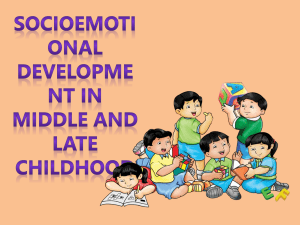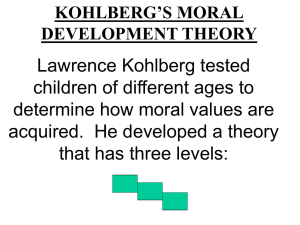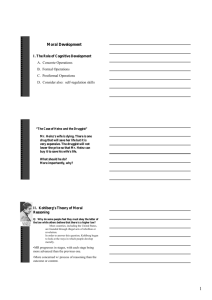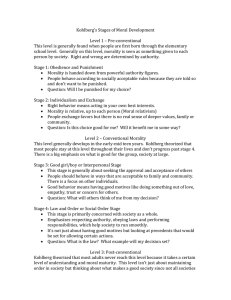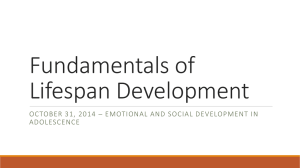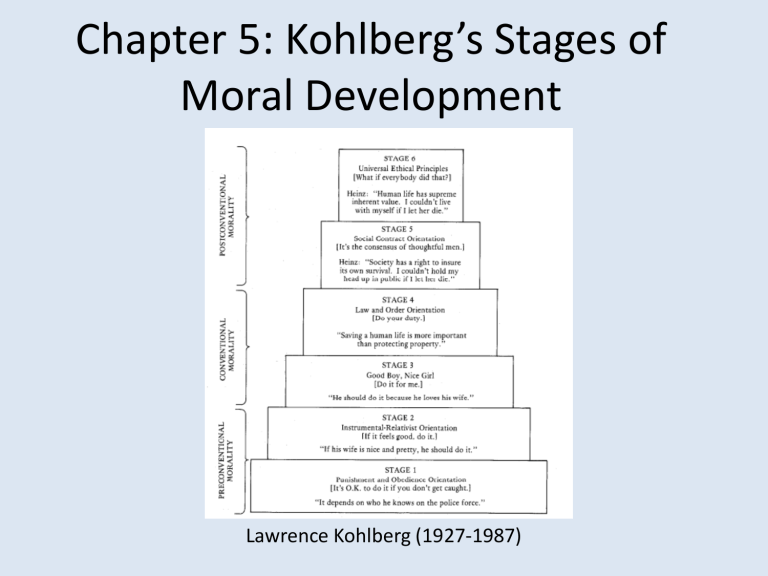
Chapter 5: Kohlberg’s Stages of Moral Development Lawrence Kohlberg (1927-1987) Kohlberg's stages of moral development constitute an adaptation of a psychological theory originally conceived of by Piaget. Moral reasoning has six developmental stages, each more adequate at responding to moral dilemmas than its predecessor. Kohlberg determined that the process of moral development was principally concerned with justice, and that it continued throughout the individual's lifetime. Kohlberg was interested in how individuals would justify their actions if placed in similar moral dilemmas. He then analyzed the moral reasoning displayed, rather than its conclusion, and classified it one of six stages. Kohlberg's scale is about how people justify behaviors and his stages are not a method of ranking how moral someone's behavior is. Kohlberg’s Six Stages • Stages cannot be skipped • Each stage provides a new and necessary perspective • Each stage is more comprehensive and differentiated than its predecessors Level 1 Pre-Conventional (2 stages) Stage 1. Obedience and punishment orientation (How can I avoid punishment?) Stage 2. Self-interest orientation (What's in it for me?) Level 2 Conventional (2 stages) Stage 3. Interpersonal accord and conformity (Social norms and the good boy/good girl attitude) Stage 4. Authority and social-order maintaining orientation (Law and order morality) Level 3 Post-Conventional (2 stages) Stage 5. Social contract orientation Stage 6. Universal ethical principles (Principled conscience) A closer look at each stage Stage 1: Obedience and punishment driven • In Stage one, individuals focus on the direct consequences of their actions on themselves. • The worse the punishment for the act is, the more "bad" the act is perceived to be. Example: "The last time I did that I got spanked so I will not do it again." Stage 2: Self-interest Orientation • Behavior is defined by whatever is in the individual's best interest • Limited interest in the needs of others • Concern for others is not based on loyalty or intrinsic respect Example: “You scratch my back I will scratch yours.” Stage 3:Interpersonal accord and conformity driven • Self enters society by filling social roles • Individuals are receptive to approval or disapproval from others • They try to be a "good boy" or "good girl" to live up to these expectations, having learned that there is inherent value in doing so. Stage 4:Authority and social order obedience driven • It is important to obey laws, dictums and social conventions because of their importance in maintaining a functioning society. • If one person violates a law, perhaps everyone would-thus there is an obligation and a duty to uphold laws and rules. • Most active members of society remain at stage four, where morality is still predominantly dictated by an outside force. Stage 5: Social contract driven • The world is viewed as holding different opinions, rights and values • Laws are regarded as social contracts rather than rigid edicts. • Those that do not promote the general welfare should be changed to meet “the greatest good for the greatest number of people.” • Democratic government is based on stage five reasoning. Stage 6:Universal ethical principles driven • • • • • Moral reasoning is based on abstract reasoning using universal ethical principles. Laws are valid only insofar as they are grounded in justice. A commitment to justice carries with it an obligation to disobey unjust laws. The individual acts because it is right, and not because it is instrumental, expected, legal, or previously agreed upon. Kohlberg found it difficult to identify individuals who consistently operated at that level Heinz Dilemma • A dilemma that Kohlberg used in his original research was the druggist's dilemma: “Heinz Steals the Drug In Europe.” • From a theoretical point of view, it is not important what the participant thinks that Heinz should do. • Kohlberg's theory holds that the justification the participant offers is what is significant, the form of their response. Criticisms of Kohlberg’s Stages of Moral Development Theory • Emphasizes justice to the exclusion of other moral values, such as caring. • Although they progress through the stages in the same order, individuals in different cultures seem to do so at different rates. • Psychologists have also questioned the assumption that moral action is primarily a result of formal reasoning. Reference Absolute Astronomy. (n.d.). Kohlberg’s stages of moral development. Retrieved from http://www.absoluteastronomy.com/topics/Kohl berg%27s_stages_of_moral_development

